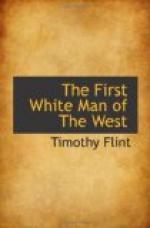No scholar ever displayed more decided pre-eminence in any branch of learning, than he did above the boys of his years, in adroitness and success in this species of hunting. This is the only distinct and peculiar trait of character recorded of his early years. The only transmitted fact of his early training is presented in the following anecdote.
In that section of the frontier settlement to which Boone had removed, where unhewn log cabins, and hewn log houses, were interspersed among the burnt stumps, surrounded by a potato patch and cornfield, as the traveller pursued his cow-path through the deep forest, there was an intersection, or more properly concentration of wagon tracks, called the “Cross Roads,”—a name which still designates a hundred frontier positions of a post office, blacksmith’s shop, and tavern. In the central point of this metropolis stood a large log building, before which a sign creaked in the wind, conspicuously lettered “Store and Tavern.”
To this point, on the early part of a warm spring morning, a pedestrian stranger was seen approaching in the path leading from the east. One hand was armed with a walking stick, and the other carried a small bundle inclosed in a handkerchief. His aspect was of a man, whose whole fortunes were in his walking stick and bundle. He was observed to eye the swinging sign with a keen recognition, inspiring such courage as the mariner feels on entering the desired haven.
His dialect betrayed the stranger to be a native of Ireland. He sat down on the stoup, and asked in his own peculiar mode of speech, for cold water. A supply from the spring was readily handed him in a gourd. But with an arch pause between remonstrance and laughter, he added, that he thought cold water in a warm climate injurious to the stomach and begged that the element might be qualified with a little whisky.
The whisky was handed him, and the usual conversation ensued, during which the stranger inquired if a school-master was wanted in the settlement—or, as he was pleased to phrase it, a professor in the higher branches of learning? It is inferred that the father of Boone was a person of distinction in the settlement, for to him did the master of the “Store and Tavern” direct the stranger of the staff and bundle for information.
The direction of the landlord to enable him to find the house of Mr. Boone, was a true specimen of similar directions in the frontier settlements of the present; and they have often puzzled clearer heads than that of the Irish school-master.
“Step this way,” said he, “and I will direct you there, so that you cannot mistake your way. Turn down that right hand road, and keep on it till you cross the dry branch—then turn to your left, and go up a hill—then take a lane to your right, which will bring you to an open field—pass this, and you will come to a path with three forks—take the middle fork, and it will lead you through the woods in sight of Mr. Boone’s plantation.”




